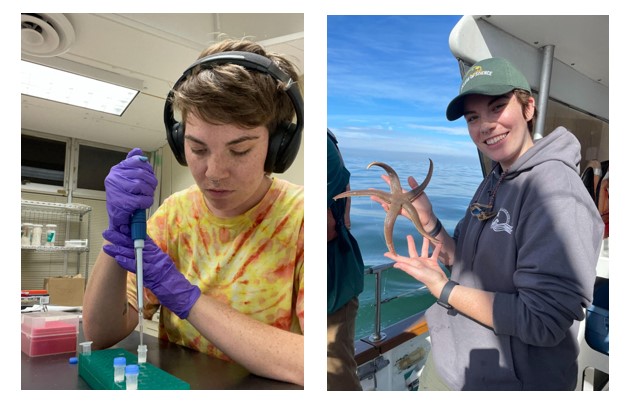Randi Barton (Marine Science, M.S.)

December 16, 2022
By Jianshan Chen Khalsa
“I cannot stress enough how much the faculty at CSUMB have helped me with not only my professional career but also my confidence as a researcher.”
Randi Barton is a third-year graduate student in CSUMB’s Master’s program in Marine Science, working with Dr. Alison Haupt at Moss Landing Marine Laboratories. She is interested in using genetics to better understand marine parasites. While completing her graduate studies, Randi has worked as a Lab Assistant for the Granite Canyon Marine Pollution Studies Laboratory, an environmental toxicology lab that focuses on agricultural and urban pollution, and the effects of pollutants in aquatic ecosystems. She has also worked as a teaching associate at CSUMB, instructing students in laboratory experiments. We contacted Randi to gain more insight into her experience. Her interview is presented in below.
What is your career goal?
I want to work at a field-related position where I am able to conduct research and the data to inform conservation management. I don’t necessarily have a focal species or system in mind, but that is the beauty of a lot of these molecular techniques and skills—the applications are very broad.
Why did you choose CSUMB?
I originally came to CSUMB as an undergraduate because of the location and the size of the school. I prefer living in a quieter town that is in close proximity to a lot of natural environments that I can explore. The smaller sizes of the classes at CSUMB allow for the unique experience of hands-on learning, and really getting to know and work closely with your professors. This made developing my professional skills that much easier and contributed greatly to my decision to continue my education at CSUMB as a graduate student.
How was the bond between you and the faculty at the school?
I cannot stress enough how much the faculty at CSUMB has helped me with not only my professional career but also my confidence as a researcher. As an undergraduate, the professors and graduate student teaching assistants that I knew really helped me understand that a career in STEM was actually tangible. The opportunities I had to work with professors on their individual projects outside of the classroom really prepared me for graduate school, and those relationships helped me to make the connections I needed to be successful in science.
How did CSUMB prepare you for your career?
The hands-on nature of a lot of the classes at CSUMB have really helped me to know what kinds of jobs I would and wouldn’t want to work in after school. I learn the best when I can practice doing those things, and I feel like CSUMB classes are really built with that in mind. I have also learned skills such as time management, thinking through and troubleshooting problems, communicating my thoughts and questions to others, and properly investigating answers to my questions—skills that I feel are essential for any working scientist.
How has participation in community service and/or extracurricular activities changed your perception of the role of the individual in the community?
I think sometimes it is easy to think you are separate from your community. Community service and other extracurricular activities that I have participated in have reminded me that the success and health of my community also affects me and that being active in my community benefits myself as much as it benefits the community. All individuals within a community are connected in some way, even when you may think you aren’t.
What suggestions would you give to the students at CSUMB?
I always tell my students to take advantage of the many opportunities available to them at CSUMB. Pay attention to the flyers in the hallways and the emails sent to you by the school for projects or extracurricular opportunities. Even if you are not sure what you want to do in the future, ask your professors if they need any help with the projects they are working on or if they know anyone who is looking for student researchers. Seek out experiences and throw yourself into them. You can always move on if the project does not fit, but it helps you build your resume, your professional confidence, and you may even stumble into something that you want to pursue further.